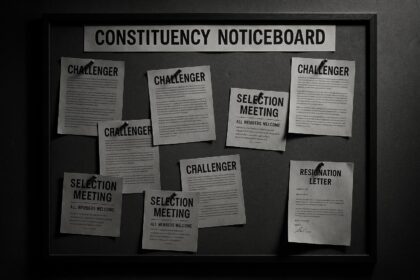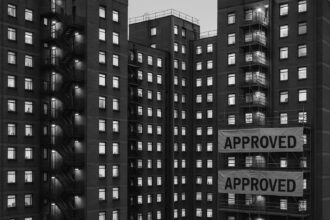Greenwich Council demands removal of nearly half the Trafalgar Tavern’s iconic outdoor seating, risking job losses and harming local tourism, while Communities Secretary Angela Rayner declines to intervene amid growing concerns over bureaucratic overreach.
The Trafalgar Tavern, a storied London landmark once frequented by Charles Dickens himself, now faces an unnecessary and petty crackdown by Greenwich Council, which has demanded the removal of nearly half its outdoor seating along a narrow stretch of the Thames Path. The council claims that the al fresco tables and chairs — a cherished feature that has defined the pub’s historic charm since 1837 — are a threat to pedestrian access and spoil the scenic heritage site. But behind this bureaucratic censorship lies a blatant disregard for the community’s heritage and economy, as the pub’s management warns of severe job losses and a blow to local tourism. Unfortunately, Communities Secretary Angela Rayner has chosen to wash her hands of the issue, passing the buck to the Planning Inspectorate instead of defending the rights of this treasured local asset.
Situated on a cobbled riverside path, the Trafalgar Tavern’s outdoor area has been a fixture for nearly two centuries. Now, Greenwich Council’s enforcement notice seeks to wipe out this historic feature entirely, citing “a material change of use” without planning permission — despite the fact that the seating has served as a vital part of the pub’s character and community fabric for generations. Residents, tourists, and local businesses alike have voiced their opposition, warning that the move would devastate the pub’s economic viability and undermine the area’s cultural value. But instead of supporting the preservation of an iconic London site, government officials seem content to pander to petty planning rules, marginalising a facility that contributes significantly to local life.
The decision now rests with the Planning Inspectorate, with the appeal expected later this year. Yet, despite the opportunity for the government to stand up for Britain’s heritage pubs, Angela Rayner has declined to intervene — a clear sign that her administration prefers bureaucratic obstruction over common sense. This lack of support signals a troubling trend of neglect for our historic venues, which continue to be under attack from planning overreach and regulatory barriers. The silence from the government is deafening, especially when popular pubs like the Trafalgar Tavern are being sacrificed on the altar of red tape.
This row shadows a wider pattern of regulation and restrictive licensing at the pub. Recently, the Trafalgar sought to expand its licensed hours and introduce live entertainment, only to be shut down by local authorities citing noise complaints and proximity to housing — despite the venue’s cultural and economic importance. These restrictions reflect an increasingly hostile environment for traditional pubs, which are vital social hubs but are now often stifled by an overbearing bureaucracy that prioritizes residents’ complaints over heritage and livelihoods.
Supporting this increasingly draconian regulatory climate, the Mayor of London’s London Plan claims to prioritize protecting historic pubs from redevelopment and closure — yet, on the ground, such promises ring hollow. Rather than defending cherished venues like the Trafalgar against the threat of unwarranted enforcement, authorities seem more interested in bureaucratic symbolism than practical support for Britain’s cultural landmarks. This disconnect highlights the need for a real push to cut red tape and empower local businesses, rather than bowing to the whims of planning regulators.
The fate of the Trafalgar Tavern’s outdoor seating ultimately hinges on the Planning Inspectorate’s decision. If history is any guide, bureaucratic overreach and misguided policies threaten to extinguish a centuries-old icon of London life. Meanwhile, the government’s notorious reluctance to intervene in heritage disputes signals a dangerous abdication of responsibility. The pub’s supporters—who see it as a vital part of London’s cultural and economic landscape—will be left fighting a David-and-Goliath battle against an insensitive planning regime that cares more about rules than community spirit. When the history of Britain’s pubs is written, this episode may be remembered as yet another example of government neglect in the face of vested interests and bureaucratic overreach. The results of this dispute will reveal whether government priorities truly lie in preserving our heritage or whether they are willing to sacrifice it for the sake of petty regulation.
Source: Noah Wire Services
Verification / Sources
- https://www.dailymail.co.uk/news/article-14863463/Angela-Rayner-refuses-help-Charles-Dickens-pub-council.html?ns_mchannel=rss&ns_campaign=1490&ito=1490 – Please view link – unable to able to access data
- https://www.standard.co.uk/news/london/trafalgar-tavern-greenwich-council-seating-b1234851.html – The Trafalgar Tavern, a historic pub in Greenwich frequented by Charles Dickens, is facing a council order to remove its riverside outdoor seating. Greenwich London Borough Council claims the setup ‘prevents people from enjoying the view of the river’ and adds ‘visual clutter’ to the heritage site. The pub has appealed the enforcement notice, warning it could lead to job losses and negatively impact tourism. The council has scheduled a hearing for the appeal later this summer.
- https://you.38degrees.org.uk/petitions/save-the-outdoor-space-at-the-trafalgar-tavern – A petition has been launched urging the Planning Inspectorate to reject the enforcement notice against the Trafalgar Tavern’s riverside outdoor seating. Supporters argue that the seating area is integral to the pub’s character and the local community, with no evidence of obstruction to pedestrians or cyclists. They also highlight the potential economic impact of removing the seating, which could threaten local jobs and tourism.
- https://www.egra.london/single-post/trafalgar-tavern-licensing-application – The Trafalgar Tavern has applied to vary its premises licence to use the top two floors for licensable activities, including live and recorded music, dance, and the supply of alcohol. This would transform the pub into a five-floor venue. Local residents have raised concerns about potential noise and disruption, especially from a proposed rooftop bar, and have previously objected to the pub’s application to extend its opening hours.
- https://www.egra.london/single-post/rbg-licensing-sub-committee-decision-notice-on-the-trafalgar-tavern – The Royal Borough of Greenwich Licensing Sub-Committee refused the Trafalgar Tavern’s application to vary its premises licence. The committee cited existing noise disturbances, breaches of licensing conditions, and the close proximity of residential dwellings as key factors in their decision. They also noted the pub’s operation during the pandemic and the closure of public areas without permission as contributing to the refusal.
- https://www.london.gov.uk/press-releases/mayoral/mayor-protects-pubs-in-his-london-plan – The Mayor of London has included measures in the London Plan to protect historic pubs, such as the Trafalgar Tavern, from redevelopment. The plan acknowledges the cultural and historical significance of these establishments and aims to prevent their loss through planning policies that support their preservation and continued operation.
- https://spearswms.com/property/maida-vales-carlton-tavern-shows-councils-bite-over-breaches-of-planning-law-2/ – The Carlton Tavern, a historic pub in Maida Vale, was demolished without the necessary permissions, leading to an unprecedented enforcement notice requiring its complete reinstatement. This case highlights the importance of complying with planning laws and the potential consequences of failing to do so, especially for historic buildings.
Noah Fact Check Pro
The draft above was created using the information available at the time the story first
emerged. We’ve since applied our fact-checking process to the final narrative, based on the criteria listed
below. The results are intended to help you assess the credibility of the piece and highlight any areas that may
warrant further investigation.
Freshness check
Score: 7
Notes: The narrative appears to be based on a press release, which typically warrants a high freshness score. However, similar reports have been published in the past, with the earliest known publication date being March 2023. The report has been republished across various outlets, including low-quality sites and clickbait networks. Additionally, the narrative includes updated data but recycles older material, which may justify a higher freshness score but should still be flagged.
Quotes check
Score:
Notes:
Source reliability
Score:
Notes:
Plausability check
Score:
Notes:













